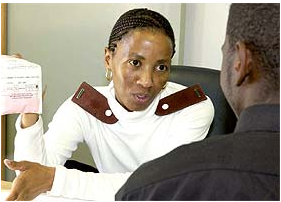 GUARD AGAINST DEADLY TB STRAIN
GUARD AGAINST DEADLY TB STRAIN
In the past few months, a lot has been written in the media about the deadly type of tuberculosis (TB) called Extreme Drug Resistant Tuberculosis (XDR-TB).
XDR-TB is more dangerous than ordinary TB because it is stronger than at least six types of drugs or medicines that treat ordinary TB.
This form of TB was detected in the 1990s. Cases of XDR-TB have recently been reported in KwaZulu-Natal and there have been a small number of cases in Gauteng and the Free State.
No new TB drugs have been developed in the past 30 years. This makes XDR-TB even more difficult to treat.
How XDR-TB is spread
Like ordinary TB, XDR-TB is spread through the air when a person with TB sneezes or coughs and another person breathes in the germs.
People get this TB easier if their bodies are weak due to poor nutrition, smoking, alcoholism, ageing, stress or diseases like uncontrolled diabetes, cancer, and HIV and Aids.
Who is at risk
The majority of healthy people are not at risk of getting this Khangaledisease, unless they come into contact with a person who has XDR-TB and who has:
- not received proper treatment; or
- has been on the treatment for less than a week.
What to do if you have been in contact with infected people
If you live or work with a person with XDR-TB or have any of the signs of the disease, you must go to a clinic or hospital as soon as possible to be tested.
If the test is positive, you can get free treatment from your clinic. Start taking your medicine immediately and keep taking it for six months.
Ask someone like a health or community care worker, friend or family member to help you keep to the treatment plan.
Live healthy by eating healthy food, getting exercise, avoiding alcohol, and not smoking.
Can XDR-TB be cured?
Yes, in some cases, but it depends on the strength of the disease, proper treatment, and the patient’s general health.
What should a diabetic person eat?
Eating healthy food is a very important part of controlling diabetes. Your clinic or doctor will give you advice on how to eat correctly and draw up a special eating plan for you.
- Ndivhuwo Khangale
TYPES OF DIABETES
- Type 1: Also known as insulin-dependent diabetes. Children usually get it and it is usually diagnosed before the age of 40.
- Type 2: Also known as noninsulin dependent diabetes. Adults usually get it and it is mostly associated with overweight.
- Gestational diabetes: This type starts during pregnancy and usually disappears after the child is born.



 Facebook
Facebook Twitter
Twitter WhatsApp
WhatsApp